|
|
|
Sort Order |
|
|
|
Items / Page
|
|
|
|
|
|
|
| Srl | Item |
| 1 |
ID:
102881
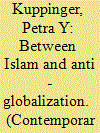

|
|
|
| 2 |
ID:
102935
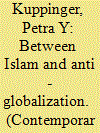

|
|
|
|
|
| Publication |
2011.
|
| Summary/Abstract |
This paper examines the Islamische Zeitung (IZ), a newspaper made by German Muslims for German Muslims that informs about political, cultural, and theological topics. I argue that beyond providing information, the paper aims to create a platform of debate for a growing group of, in particular, younger pious educated Muslims who examine current politics by way of an Islamic and also an anti-globalization perspective. Of relevance for this audience are Islamic knowledge, local and global politics, everyday religious concerns and practices, and cultural affairs. I illustrate how by discussing certain topics on its pages, the makers of the IZ support specific issues of debates among some pious individuals, such as for example the participation of pious Muslims (men and women) in the democratic process by way of running in elections. Finally I argue that the IZ seeks to link the German Muslim community to the context of the global ummah and here in particular the globalized ummah as a new community marked by a shared popular culture universe. I illustrate that contrary to the claims of some of its opponents, the IZ is a platform for German Muslim affairs that participates in the broader public sphere as much as it helps to mediate a variety of possibilities for the participation of individuals and communities.
|
|
|
|
|
|
|
|
|
|
|
|
|
|
|
|
| 3 |
ID:
187447
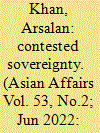

|
|
|
|
|
| Summary/Abstract |
Pakistan has witnessed the rise of a range of Islamic forces that claim to be defending Islam from what they imagine to be a deluge of incidents of blasphemy, a veritable moral panic organized around a set of blasphemy laws pertaining to the regulation and protection of Islam. The violence of blasphemy politics, which is disproportionately directed at sectarian and religious minorities, is predicated on the claim that is the duty and mandate of the state to enforce the blasphemy laws, and where the state fails, the onus falls on ordinary Muslims to fulfill the demands of Islam. In this article, I focus on the response to this blasphemy politics by Pakistani Tablighis, practitioners of the transnational Islamic piety movement the Tablighi Jamaat. Like other Islamic groups in Pakistan, Tablighis consider blasphemy to be a grave sin and a deep threat to the Islamic community, but Tablighis believe that the solution to the growing incidence of blasphemy is to spread virtue through their distinct form of face-to-face preaching (dawat). I show that these different ethical responses to blasphemy reflect different approaches to the relationship between Islam and state sovereignty. Specifically, I argue that blasphemy politics presupposes the sacralization of the state but Islamic piety among Pakistani Tablighis provides an alternative ethical framework for addressing the moral injury of blasphemy.
|
|
|
|
|
|
|
|
|
|
|
|
|
|
|
|
| 4 |
ID:
106697
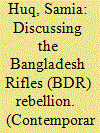

|
|
|
|
|
| Publication |
2011.
|
| Summary/Abstract |
This article explores the piety/politics nexus by asking what it means when educated, urban Bangladeshi women who are embracing religion anew claim that their pursuit of piety, and the learning circles that inspire it, are apolitical. I explain this self-proclaimed apolitical stance through women's own accounts of why and how they maintain political neutrality. The article demonstrates that organizers of many Islamic discussion circles in Dhaka consciously strive to attain a certain political neutrality, while allowing whoever is interested to attend, irrespective of the latter's political affinities. This decision stems from an understanding of the lack of trust that accompanies organized religion in Bangladesh, and its alliance, in the national imaginary, with the explicit political agenda of the Jama'at-i Islami. The article provides an account of different discussion circle members' varied articulation of political neutrality and how they draw from different ideas and discourses about being publicly religious in their molding of the ideal, pious, Bangladeshi woman. To exemplify the pious self-fashioning of urban, educated, Bangladeshi women, I will recount the ways in which several women discussed the March 2009 Bangladesh Rifles mutiny-a highly politically charged event. Women's accounts of the mutiny serve to unify lesson attendees around the cultivation of piety. Contestations over national politics and political affinities are made secondary, as women focus on giving an ethical bend to the deeply personal, subjective and gendered experiences of being educated and upwardly-mobile in present day urban Bangladesh.
|
|
|
|
|
|
|
|
|
|
|
|
|
|
|
|
| 5 |
ID:
178038
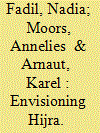

|
|
|
|
|
| Summary/Abstract |
Within the current Western European context, where the presence of Islam in the public sphere has become an object of continuous polemics and debates, emigrating or ‘leaving Europe’ has emerged as a conceivable option among a wide range of people who identify as Muslim. Both within and beyond specific pious circles such migratory moves have sometimes been framed as hijra. This special issue enquires into the way hijra is imagined and experienced, but also how the issue of hijra is debated and acted upon among European Muslims who are contemplating the possibility of leaving Europe, or who have already left the continent. In order to cover both the specific and the more general dynamics surrounding hijra, this thematic issue is motivated by one, albeit multi-layered hermeneutical objective. In general terms, we aim to understand the complex and multiple significations operating around the notion of hijra among European Muslims of various backgrounds and convictions. In so doing we seek to contribute to the mounting anthropology of Islam in Europe by examining articulations of mobility and migration through religious imaginaries and repertoires. This implies ethnographically accounting both for the perspectives and assessments of those who are situated and located in Europe and desire to leave the continent in order to perform the hijra, as well as for the ways in which hijra is lived and practiced by those who have left Europe and moved to a Muslim-majority context. In order to buttress further the emerging anthropological field at the nexus of religion and mobility/migration, this introduction cautiously maps out a number of analytical concepts which we think could strengthen the multifaceted ethnographic ventures of the contributions comprising this thematic issue: the ‘ethics of dwelling’, ‘regimes of mobility/diversity’ and religious imaginaries and repertoires, being the most prominent.
|
|
|
|
|
|
|
|
|
|
|
|
|
|
|
|
| 6 |
ID:
160379
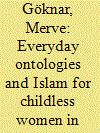

|
|
|
|
|
| Summary/Abstract |
This article discusses the significance of everyday Islam as a gendered locus for socialisation. Religious practices and conversations about religion comprise a major part of quotidian activities in the two villages in northwestern Turkey where the research took place. Men and women's everyday interaction with Islam dominated their ways of thinking, acting and especially socialising. Exploring the ways in which the Qur’an and the Hadith as discursive resources of Islam influence power relations and everyday practices, the article argues that Islamic morality co-exists with everyday Islam.
|
|
|
|
|
|
|
|
|
|
|
|
|
|
|
|
| 7 |
ID:
152265
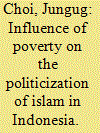

|
|
|
|
|
| Summary/Abstract |
This study deals with the influence of poverty as a socioeconomic cause of political Islam. Using Indonesian survey data, it explores how Muslims come to support Islamic political parties, and whether the variable of poverty or low income predicts politicization of Islam with other variables under control.
|
|
|
|
|
|
|
|
|
|
|
|
|
|
|
|
| 8 |
ID:
106693
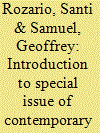

|
|
|
| 9 |
ID:
106699
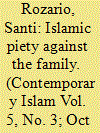

|
|
|
|
|
| Publication |
2011.
|
| Summary/Abstract |
One might suppose that a foundational element of proper Muslim behaviour is respect for one's parents. However, it is not unusual in the contemporary Islamic world, both in Muslim-majority countries and in the diaspora, for young people to be much more 'Islamic' in behaviour, dress and lifestyle than their parents. As this may suggest, modernist Islamic piety is not infrequently directed by young people against their parents, as a mode of resistance to parental authority. However, wearing the hijab, becoming a follower of a Sufi shaykh, or marrying a 'good' Muslim spouse from another ethnic group to one's own, are different kinds of resistance from, for example, joining an inner-city youth gang, or rejecting one's parents' Asian cultural background for a more globalised identity. I discuss some of the ways in which Islamic piety can be deployed in resistance to parental authority through case studies from my Economic and Social Research Council-funded field research in Bangladesh and the UK, and consider in what ways these forms of behaviour resemble, and differ from, more familiar forms of resistance.
|
|
|
|
|
|
|
|
|
|
|
|
|
|
|
|
| 10 |
ID:
160375
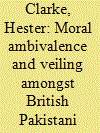

|
|
|
|
|
| Summary/Abstract |
This article explores perceptions and performances of veiling as they are mediated by notions of piety, overlapping and alternative moral narratives, and understandings of belonging. For the young British Pakistani women I met in Sheffield, expressions of piety such as veiling, are negotiated through an underlying understanding of possessing ‘good intention’ and related moral discourses of being a ‘good person’ and a ‘good girl’. Discussions of what it means to be ‘good’, whether explored through narratives of piety, universal personhood or gendered ethnic identity, are mediated by relations with kin, the wider Pakistani community and understanding of British multiculturalism. In this article, the author argues that veiling practices should be explored not only through the multiple moral discourses which influence women's choices, but the wider raced and classed structures in which such choices are embedded.
|
|
|
|
|
|
|
|
|
|
|
|
|
|
|
|
| 11 |
ID:
119174
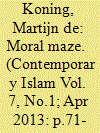

|
|
|
|
|
| Publication |
2013.
|
| Summary/Abstract |
The Salafi movement presents itself as a moral guardian of Muslims in a world that, according to many, is filled with moral crisis, temptations and anti-Islam tendencies. Salafis claim that it is essential to return to the community of the pious forefathers seen as the most outstanding community of all times with the highest absolute moral standard. In this article I will show how individual participants engage with this idea of a moral community of believers yet remain vulnerable to the ambiguities and ruptures inherent in everyday life and within the Salafi movement. By exploring how Salafis passionately try to search for the 'correct' knowledge and strive to maintain a unity between knowledge, conviction and behavior, and the role of friendships therein, I argue that Salafism does not remain separate from the troubles of everyday but that these issues enter into and exist in Salafi thought and practice, not by being resolved but by being transformed into personal struggles. These ambiguities and ruptures may cause problems but also provide an incentive for Salafis to continuously work at the self-improvement of one's piety, authenticity, and sisterhood and brotherhood.
|
|
|
|
|
|
|
|
|
|
|
|
|
|
|
|
| 12 |
ID:
188961
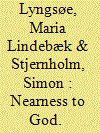

|
|
|
|
|
| Summary/Abstract |
This article advocates for an increased attention to how piously striving Muslims learn about, cultivate, and experience nearness to God. The empirical material is taken from our current research on Danish Muslims’ engagement with Islamic teaching and learning. We examine examples of oral teachings that instruct the audience to be constantly aware of God and address him directly in prayer, examples of how an awareness of God is cultivated and practiced in everyday life, and individual narratives of experiences of being close to or helped by God. With inspiration from the anthropology of Christianity as well as Islam, we propose an analytical model for understanding the process whereby Muslim efforts to draw near to God can ‘work’. Three interrelated dynamics are crucial to this process, and we identify each through our reading of existing scholarship. The dynamics at play are, respectively, a taqwa-infused faith frame, its related semiotic ideology, and a relationship of experienced reciprocal agency with God.
|
|
|
|
|
|
|
|
|
|
|
|
|
|
|
|
| 13 |
ID:
159382
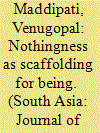

|
|
|
|
|
| Summary/Abstract |
This essay attempts to open up a conversation between M.K. Gandhi and contemporary ecological thought. Unlike ecologists, who think through the human and then reach for a wider post-human ecology, in the 1930s, Gandhi journeyed in the reverse order, arriving at an emphasis on human withdrawal into nothingness after initially thinking through the withdrawal into nothingness of an infinitely extended, non-human, celestial being. The essay explores Gandhi's emerging anthropocentric conception of the piety of nothingness in the context of a household plan designed for him in 1936–37 by Madeline Slade, in the village of Segaon in Maharashtra. The essay draws out the architectural and political entailments of Gandhi's anthropocentrism and his emphasis on varnashramadharma.
|
|
|
|
|
|
|
|
|
|
|
|
|
|
|
|
| 14 |
ID:
106694
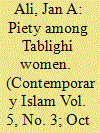

|
|
|
|
|
| Publication |
2011.
|
| Summary/Abstract |
Islamic piety in Muslim women has been on the rise in the last three decades around the world. Much of it involves formerly nominal Muslim women becoming observant of Islamic rules, rituals and practices and taking their faith seriously. For these women, it is a journey of spiritual elevation. It is a new endeavour of Islamic awakening and self discovery. All this is occurring in an era characterized by a modernity which claims, among other things, that religion is the basis for women's oppression in society. Thus, western and western-educated scholars and feminist theorists have argued for the "unveiling" of Muslim women as part of the process of weakening the hold of Islam and allowing women to become free thinking, liberal and independent. This article is an attempt to explore the continuous growth of Islamic piety in Muslim women around the world. Using the Tabligh Jama'at in Australia as a case study, the article seeks to understand the role of Islamic piety in Muslim women. The article argues that Islamic piety in Muslim women is an attempt by Muslim women to find a religious response to modernity.
|
|
|
|
|
|
|
|
|
|
|
|
|
|
|
|
| 15 |
ID:
084861
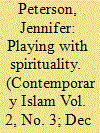

|
|
|
| 16 |
ID:
145062
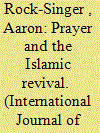

|
|
|
|
|
| Summary/Abstract |
This article traces the emergence of the early afternoon ẓuhr prayer as a key project of subject formation during the second half of the Anwar al-Sadat period (1976–81). Drawing on three Islamic magazines of differing ideological orientation (Muslim Brotherhood-Islamist, Salafi-Islamist, and state-sponsored), all containing letters to the editor and fatwa requests, it charts contestation among religious elites and the reception of their programmatic visions. Specifically, the article explores the performance of this daily prayer as a hybrid practice that disrupted the temporal and spatial claims of a state-sponsored bureaucratic order to produce national subjects within public schools and bureaucratic institutions, even as it reproduced the state's emphasis on temporal precision and social order. Based on these texts, this article challenges previous scholarly narratives that place Islamist projects of subject formation on the fringes of secularism and previous studies of Islamist mobilization that posit a separate social universe of Islamist activism.
|
|
|
|
|
|
|
|
|
|
|
|
|
|
|
|
| 17 |
ID:
081749
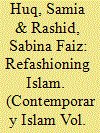

|
|
|
|
|
| Publication |
2008.
|
| Summary/Abstract |
This paper attempts to explore the development of Islamic identity of a group of elite women in Dhaka, Bangladesh. These women constitute a significant group in the country where 10% of the rich control 40% of the national wealth, and the 10% of the poorest control 1.84% of the national wealth.* Socially, politically and economically, elite women and their families are powerful and have access to resources and political influence. Many of these women who did not grow up with a very strict religious orientation came to Islam and consolidated religious thoughts and practices through a weekly Quran reading class. This particular Quran class began in 2002. The classes were initiated by a foreign diplomat's wife who was Muslim, and have continued even after her departure from the country in 2004. While Dhaka houses many meetings of Muslim men and women to discuss Islamic ideas and practices, this particular class was quite unique in its ability to attract and convert elite women whose lives were seemingly perfect. This urban elite phenomenon of Islamic revivalism has not been the subject of any in-depth research in Bangladesh, and this work therefore, is the first of its kind and largely introductory
|
|
|
|
|
|
|
|
|
|
|
|
|
|
|
|
| 18 |
ID:
154655
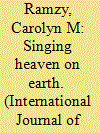

|
|
|
|
|
| Summary/Abstract |
This article explores the performative politics of devotional soundscapes at Coptic Christian mūlid festivals. Echoing the state's reformist efforts in the 1990s to transform Muslim saint festivals into utilitarian spaces and their goers into “modern” Egyptian citizens, today the Coptic Church works to refashion these popular festivals from places of debauchery into morally productive spaces. Aided by affluent Cairene-based volunteers, church choirs travel from Cairo's poshest neighborhoods to these festivals to actively sing, disseminate, and teach popular religious songs (taratīl) in an effort to develop poorer Christian pilgrims into modern, pious, and more audible “citizens of heaven.” Through the analysis of one church choir's taratīl ministry at the mūlid, I illustrate how middle-class spiritual volunteers disrupt and, at times, reinscribe the Coptic Church's disciplinary efforts on the festival's poorer pilgrims, particularly as they look to modernize popular festivity into grounds of Christian ethical transformation.
|
|
|
|
|
|
|
|
|
|
|
|
|
|
|
|
| 19 |
ID:
178039
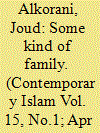

|
|
|
|
|
| Summary/Abstract |
This article follows one woman’s serial migration to, away from, and back to Dubai in order to consider the intersections of migration, subjectivity, and piety. It analyzes how Hanna’s migratory journey, or hijra, relates to her desire to become pious and reveals how people in her life shape the trajectories of both her faith and her movement. Engaging scholarship on migration and ethical subjectivity, it traces how Hanna’s mobility runs parallel to her attempt to surround herself by those who make her piety possible. Whether it is the relationship with her parents and siblings in Birmingham, or the community of “sisters in Islam” she establishes in Dubai, Hanna is moved both by aspirations of piety and by the people who support (or inhibit) her efforts, highlighting the social nature of the geographic places she moves through and inhabits. Recognizing the ability of others to help or hinder her spiritual goals, Hanna actively seeks to settle amongst those who motivate and empower her to become the ideal Muslim she desires to be. Seen in this way, Hanna’s experience allows us to shift from a notion of subjectivity premised upon individualized acts of self-cultivation like prayer, fasting, or veiling to an appreciation of the intersubjective role of others in the development of the self. Combining this intersubjective lens with an alternative account of mobility, I argue for understanding Hanna’s self-positioning as an act that is not only geographic, but (inter)subjective, with the trajectory of her piety discernible both geographically and socially.
|
|
|
|
|
|
|
|
|
|
|
|
|
|
|
|
|
|
|
|
|